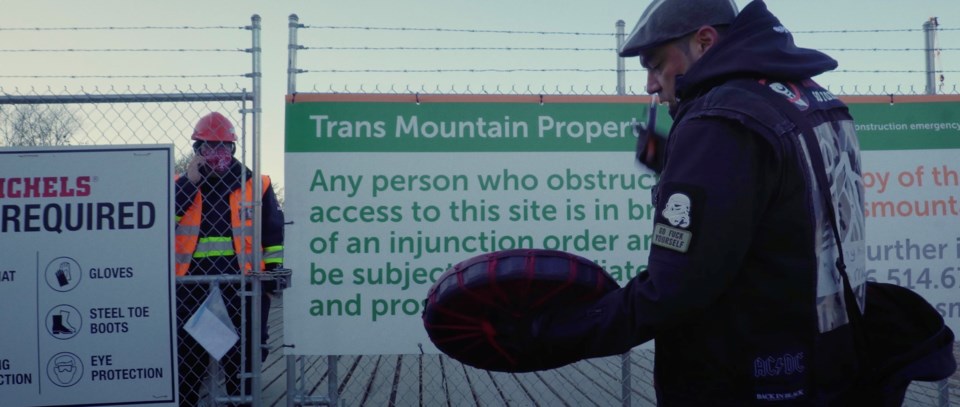Every North Shore resident is responsible for the future of the Southern Resident orca population, according to William George.
“Whether they know it or not, we’re all connected to this body of water here,” said the səlilwətaɬ (Tsleil-Waututh Nation) member and protector of the inlet.
Featured in Coextinction, a documentary showing Saturday, Nov. 13 at the Vancouver International Mountain Film Festival, George says the film will change people’s minds, and touch people’s hearts, when it comes to the climate crisis and impending extinction of the local orca population.
“That message is very strong, [the film] needs to get out there in order to see any change or create more awareness,” he said.
Directed by Gloria Pancrazi and Elena Jean, Coextinction tracks the ongoing threat to the local orca population by engaging with Indigenous leaders, activists and scientists in “an attempt to uncover corruption and stop injustice before it is too late.”
George is no stranger to fighting for climate justice and the protection of the inlet. He continues to work hard to stop the Trans Mountain Pipeline and the expected seven-fold increase in tanker traffic his territory will see once the pipeline is doubled.
“People in high rises downtown, those people having cocktails after work, they're not aware of the threat that's coming there with tanker traffic,” he said.
George said his messaging around the threat of increase tanker traffic in the inlet is simple, and even people who are staunchly in favour of the pipeline’s doubling understand the risk once he speaks with them.
“I've even got pro-pipeliners in Alberta, that would confront me, and of course, that's their livelihood, but then I tell them that it comes directly toward my traditional territories, and then they’ll agree with me.”
Speaking to the North Shore News after the documentary was filmed, George said he’s seen the “opposite” of change from the federal and provincial governments, when it comes to enacting any kind of climate crisis response.
“They're doing the absolute opposite, and that's why they're not talking about it. Trudeau, we've seen him sign documents of the UN declaration for being a climate leader. And now I don’t know what his thought process is by building this pipeline and allowing it to travel through our waters to foreign markets, creating more carbon emissions,” he said. “So yeah, they're doing the complete opposite here.”
George hopes that not only will the film light a fire in peoples’ hearts, he hopes the younger generation will also be inspired to take action against the climate crisis.
“Sometimes I think that it's up to our next generation to pick up the pieces, so fire up the youth as well. Because, when we were younger, we didn't really know too much of this, but there's a lot of highly educated youth out there that are really concerned and are going to be world changers. So, I hope this film is a part of that as well.”
For folks that see the doubling of the pipeline as a good economic move, and an infrastructure project that will benefit the communities alongside it, George said they have forgotten the essence of what British Columbia is.
“We forget how B.C. came to be – it was beautiful coastlines, with one of the largest salmon runs. [They] have simply forgotten what it is,” he said. “And now with the increased tanker traffic and the size of the vessel that are coming … we all know that mechanical failure happens, and human error happens.”
Coextinction is running during the Vancouver International Mountain Film Festival, and will be shown on Saturday, Nov. 13, at the Kay Meek Arts Centre in West Vancouver. It is presented by the David Suzuki Foundation, and following the screening, Elena Jean, Gloria Pancrazi, Will George, 'Namgis Hereditary Chief Ernest Alfred, and others will be available to take questions.
Charlie Carey is the North Shore News’ Indigenous and civic affairs reporter. This reporting beat is made possible by the Local Journalism Initiative.



